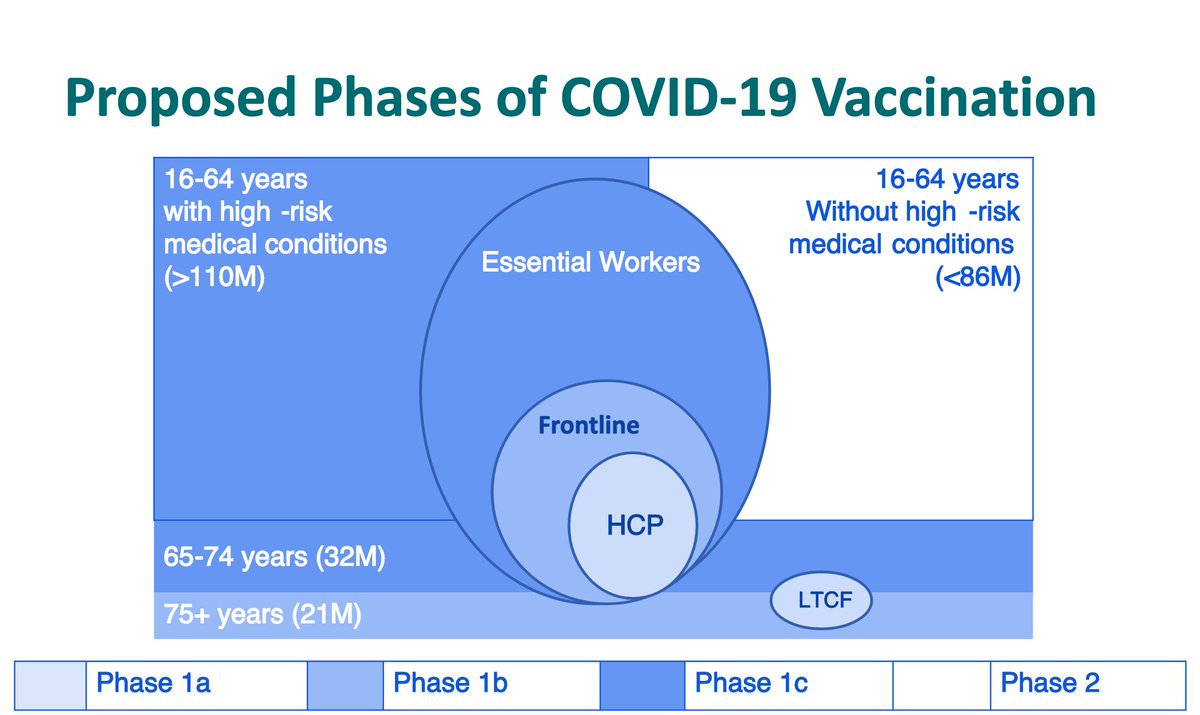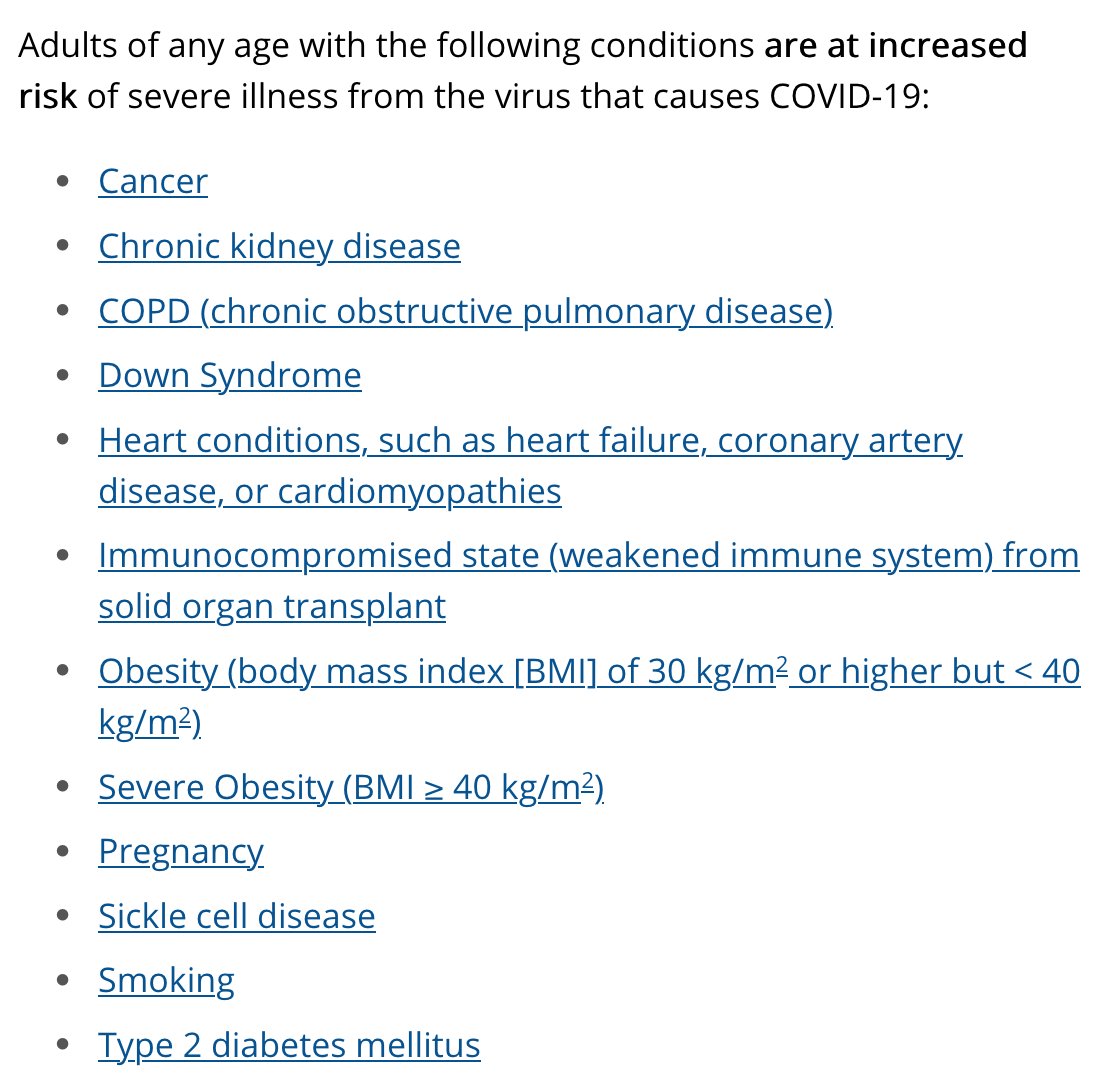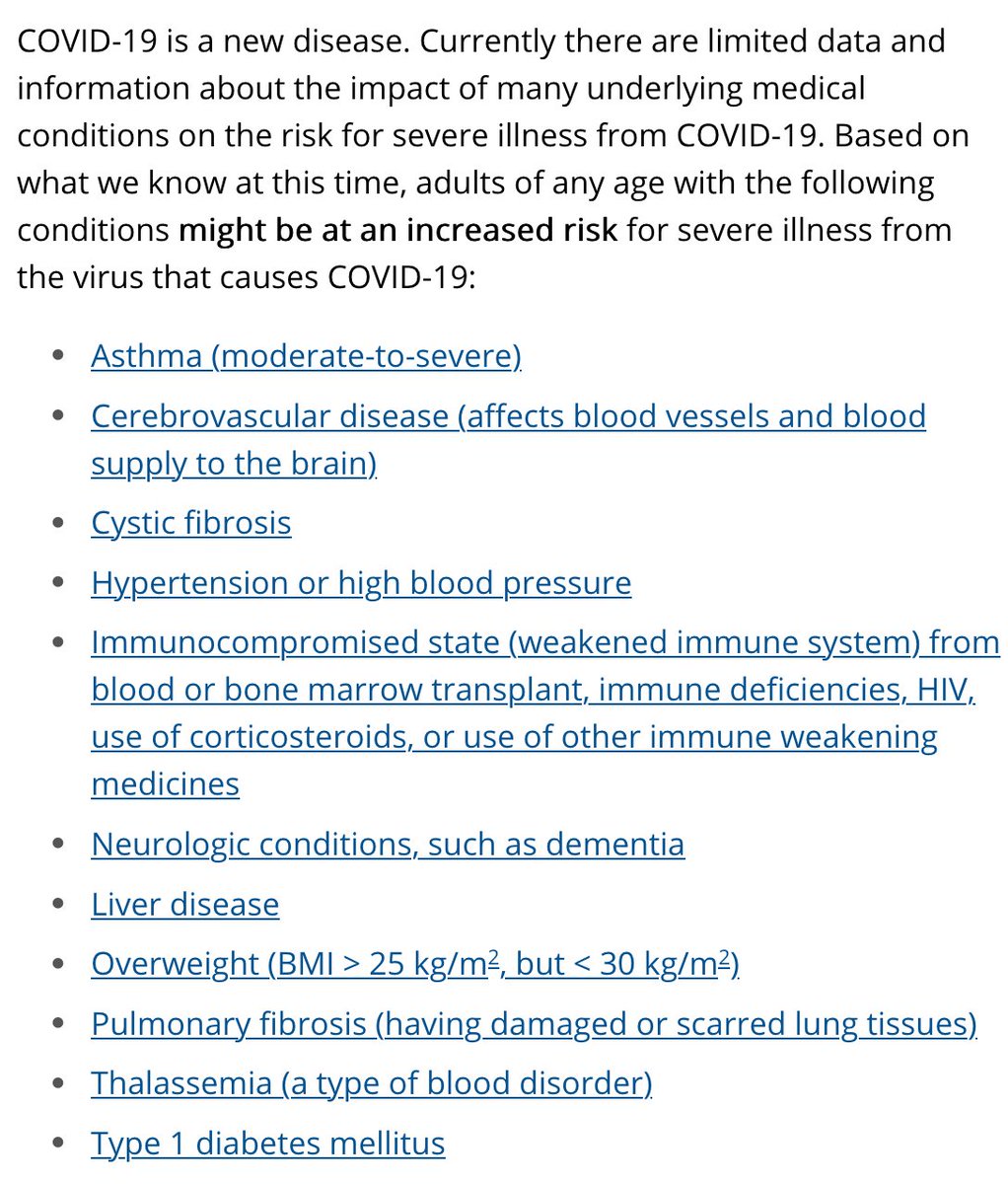There's no good answer to vaccine prioritization; we need more vaccine – massively more. And we needed it many yesterdays ago...
The thing is, there's no actually good way to prioritize on the basis of disability, there's just various shades of bad 1/
The thing is, there's no actually good way to prioritize on the basis of disability, there's just various shades of bad 1/
This is a slide from the ACIP COVID-19 Vaccines Work Group (12/20/20 – Dooling)
There are more than 110 million people, aged 16 – 64 years old, who have, what this slide calls "high-risk medical conditions"
But we don't have 220M doses of mRNA vaccine... /2
There are more than 110 million people, aged 16 – 64 years old, who have, what this slide calls "high-risk medical conditions"
But we don't have 220M doses of mRNA vaccine... /2
But what if those "high-risk medical conditions" aren't all equally risky?
Let's say someone with Condition A is 100 times more likely to die of covid compared to someone with no medical conditions, while someone with Condition B is only 2 times more likely to die... /3
Let's say someone with Condition A is 100 times more likely to die of covid compared to someone with no medical conditions, while someone with Condition B is only 2 times more likely to die... /3
If you don't have enough vaccine to vax everyone who is at increased risk, you might try to figure out the risk stratification
In other words, you might try to figure out who is at MOST risk, the HIGHEST risk, to vaccinate those people first. /4
In other words, you might try to figure out who is at MOST risk, the HIGHEST risk, to vaccinate those people first. /4
If you're trying to design a vax program, "high risk" isn't a very useful category if it contains 110 million people and you've only vaccinated 25 million people in the ~month and a half since we first started vaccinating people (outside of clinical trials). /5
So what CDC has tried to do is narrow that pool of 110 million people.
In an ideal world, well, in an ideal world there wouldn't be a plague. And if there was a plague, the last administration wouldn't have been pro-plague. And there'd be plenty of vaccine to vaccinate... /6
In an ideal world, well, in an ideal world there wouldn't be a plague. And if there was a plague, the last administration wouldn't have been pro-plague. And there'd be plenty of vaccine to vaccinate... /6
But given a very non-ideal world, what you'd ideally want to do is have perfect information. If you knew precisely how each and every medical condition increased the risk of dying from covid, you could create a rank-ordered priority list. Vaccinating those MOST at risk FIRST /7
But we don't have perfect info–far from it. We know very little about how the vast majority of medical conditions impact covid-19 relative risk.
That brings us to this page from CDC – the page we're all fighting over. /8 https://www.cdc.gov/coronavirus/2019-ncov/need-extra-precautions/people-with-medical-conditions.html
That brings us to this page from CDC – the page we're all fighting over. /8 https://www.cdc.gov/coronavirus/2019-ncov/need-extra-precautions/people-with-medical-conditions.html
CDC lists these 12 conditions under the heading "Adults of any age with the following conditions are at increased risk of severe illness from the virus that causes COVID-19" /9
https://www.cdc.gov/coronavirus/2019-ncov/need-extra-precautions/people-with-medical-conditions.html
https://www.cdc.gov/coronavirus/2019-ncov/need-extra-precautions/people-with-medical-conditions.html
And then CDC says this "COVID-19 is a new disease. Currently there are limited data and information about the impact of many underlying medical conditions on the risk for severe illness from COVID-19. "
Here are 11 conditions that CDC says "might" cause increased risk /10
Here are 11 conditions that CDC says "might" cause increased risk /10
Notice that CDC isn't talking about *how much* any of these conditions increases risk –– this is not our hypothetical rank-ordered list of risk.
Nope, we're just talking about how certain CDC is that these conditions *increase risk some amount* /11
Nope, we're just talking about how certain CDC is that these conditions *increase risk some amount* /11
The thing is? CDC is relying, by necessity, on the profoundly broken information architecture of medicine (by which I mean the enterprise of medical knowledge production) for this data.
Take a look at this page and scroll all the way to the bottom /12 https://www.cdc.gov/coronavirus/2019-ncov/need-extra-precautions/evidence-table.html
page and scroll all the way to the bottom /12 https://www.cdc.gov/coronavirus/2019-ncov/need-extra-precautions/evidence-table.html
Take a look at this
 page and scroll all the way to the bottom /12 https://www.cdc.gov/coronavirus/2019-ncov/need-extra-precautions/evidence-table.html
page and scroll all the way to the bottom /12 https://www.cdc.gov/coronavirus/2019-ncov/need-extra-precautions/evidence-table.html
Because there's not enough vaccine, CDC is trying to provide guidance that prioritizes by condition that show some increased risk in published studies.
But we can easily see some obvious problems. /13
But we can easily see some obvious problems. /13
This relies on studies being conducted. There's no rational, centrally planned effort to make sure all disease conditions are studied.
We know damn well that in medical research there are myriad biases affecting which conditions are studied & which are not. 14/
We know damn well that in medical research there are myriad biases affecting which conditions are studied & which are not. 14/
Medical research is just as distorted by kyriarchy as any other part of our broken society – conditions that disproportionately impact those shoved to the margins? Tend to have less overall research support. Less money. Fewer experts. No research infrastructure. 15/
And of course there are also problems associated with studying rare diseases
To say nothing of the fact that trying to generate data on every disease & covid risk would be so much more complicated, costly & slow than the U.S. SIMPLY DIRECTLY MANUFACTURING MORE mRNA VACCINE. 16/
To say nothing of the fact that trying to generate data on every disease & covid risk would be so much more complicated, costly & slow than the U.S. SIMPLY DIRECTLY MANUFACTURING MORE mRNA VACCINE. 16/
What we're all calling "the Moderna vaccine"?
It's actually OUR vaccine, it was co-invented by the National Institute of Allergy and Infectious Diseases* Vaccine Research Center.
It's the NIH-Moderna vaccine
*The agency Dr Fauci runs
https://www.niaid.nih.gov/news-events/promising-interim-results-clinical-trial-nih-moderna-covid-19-vaccine
It's actually OUR vaccine, it was co-invented by the National Institute of Allergy and Infectious Diseases* Vaccine Research Center.
It's the NIH-Moderna vaccine
*The agency Dr Fauci runs
https://www.niaid.nih.gov/news-events/promising-interim-results-clinical-trial-nih-moderna-covid-19-vaccine
Instead of the United States gov't saying, "this is a pandemic & millions are dying so we're going to put human life before your profits, we're just going to make as much of the vaccine as quickly as humanly possible" we ... didn't do that.
Instead: https://www.washingtonpost.com/business/2020/08/28/moderna-vaccine-patents-darpa-funding/
Instead: https://www.washingtonpost.com/business/2020/08/28/moderna-vaccine-patents-darpa-funding/
Against that backdrop of scarcity – scarcity driven by privileging PHRMA greed over the future of the human race (no, I'm not being melodramatic, I'll come back to this later) –we see states choosing not just how to interpret CDC's guidance, but whether to implement it at all /19
I'll talk about how some states are catastrophically failing* on that front tomorrow
*and what we might be able to do about it. 20/20
*and what we might be able to do about it. 20/20

 Read on Twitter
Read on Twitter





